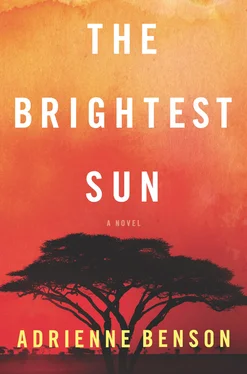Leona’s car was dented and rusted to the point of being colorless. Now, she pulled the back door open, grateful it was unlocked—her shaking hands could never have managed a key—pushed Adia into the back seat and clicked the child’s seat belt firmly. She didn’t say goodbye to the people she’d lived with for so long, she didn’t let Adia say goodbye. She was frantic to leave, driven by the thought that if she didn’t go now, her own fear would force her to change her mind again and leave Adia behind. Simi was screaming frantically on her knees in the dust, other women gathering by her, and one began running toward the car. Leona slammed the driver’s-side door shut so violently that the window slid down into the door frame, off its track, rendering it useless. She managed to fit the key into the ignition and start the car. She popped the brake and hit the gas pedal. Adia screamed and screamed, crying out for Simi as the car bumped wildly on the lumpy, dusty road. She banged on the window with her small fist and kicked the back of Leona’s seat.
Leona felt like a kidnapper.
It was getting dark when the lights of Narok emerged on the horizon. Leona hated driving at night. There were too many hazards—broken-down trucks in the road you couldn’t see until it was too late to avoid them, elephants wandering, antelope shocked into stillness right in front of you by the flash of your headlights. Leona knew of too many car accidents to take it lightly, and when she reached the cluster of buildings that made up the Narok town, she shuddered the Renault to a stop in front of the Chabani Guest House. She hadn’t been here since the night of Adia’s conception. She felt a flutter of nerves. What if he was here? What would she say? But the lobby was empty, and when the attendant showed Leona to the nicest room—one of only three with an en suite bath and more than one light to read by—the hall was empty, too.
That night, Leona avoided the bar. Instead, she walked a teary-eyed Adia to a café down the street. Adia, over and over again, asked for Simi, for her mother.
“I want to stay with my mother,” she said once. “Not with you.”
Leona lied and told the girl they’d go back home soon. She ordered Adia french fries, grilled meat and ice cream. The novelty of the ice cream worked. This is a vacation, she told her daughter. Back in the hotel, Adia consented to a shower and laughed at the feeling of water pouring over her head and down her back. When she climbed into bed, wet hair slicked against her neck, looking as small and pale as a grub, she asked Leona what the sheets were for? The pillow?
Her own daughter had never slept on a mattress. The thought shouldn’t have been a surprise, but it shocked her. Leona flicked off the light and lay in the dark. She remembered her own childhood home, her father distant and silent, with hard, hard hands. She remembered what it felt like when she was a child and a stranger in her own life. She thought of the man who gave her Adia, a gift that terrified her into numbness for so long. The girl lay in the bed beside her, so close Leona could feel the rise and fall of her breathing, the tiny lungs; the warm air she expelled.
When Leona finally fell asleep, she fell asleep with Adia’s soft hair under her chin and her arm wrapped around Adia’s shoulders. There wasn’t a nightmare that night. Leona’s sleep was calm. She dreamed about the sky, clear and calm and infinite. It was the kind of sky she remembered from one long ago summer when she was a child, and the darkness hadn’t bloomed inside her, and the endless rain hadn’t come.
When Leona woke up it was barely light. A centipede trailed along the polished floor and Leona watched it disappear and reappear through the shadows. She absently smoothed back Adia’s hair with her palm. They were in Narok now. The white Kenyan came here, Leona knew. He lived nearby. If they waited long enough, asked the right people the right questions, they could find him. Leona was sure of that. She felt a twinge inside of her somewhere, a place so deep she’d almost forgotten, silent and still but, finally, shivering with potential. The sky was getting lighter outside the window and there were squares of light on the wall opposite the bed. Leona twisted her back so she was facing her baby. She traced her finger along the small nose that looked like hers, the ears that reminded Leona of her own mother’s. Then she recognized the feeling that was so tiny and so deep down between her bones. Hope was a seed inside of her.
A WOMAN LIKE A WILDERNESS
Simi’s earliest memory was one she wished she could forget. Mostly she pushed it to the back of her mind and kept it trapped there in the dark. Sometimes, though, mostly while she slept, it slipped out of its confines and floated, ghostly, into her consciousness.
The details were no longer clear. In her memory, the inkajijik was chilly. That didn’t make sense, Simi knew, because her mother was a good Maasai woman who always kept burning embers in her fire pit. She would never allow the fire to burn out or let the air chill. There would have been fire. But still, in Simi’s adult mind, the memory was cold. It was a typical evening, happy and calm. She and her mother and brother sat by the fire. Simi and her brother were telling their mother about their day at school. Their mother loved hearing about school and was proud that she was sending both her children, not just her son.
Simi’s family was rich in cattle and children. Her mother was her father’s fourth wife. This was a lucky thing for Simi because by the time she was born he’d grown accustomed to the demands children placed on his time and his money. Mostly her father kept away from the children, and he only visited Simi’s mother’s house when he needed something. He spent his time with other elders under the shade of an acacia tree. One of his wives made honey beer, and he enjoyed that and spent most nights in her hut. Sometimes he liked the honey beer so much his speech slurred and his walking became erratic. Before the night when everything changed, Simi thought her father was funny when he was drunk. Afterward, it made her hate him.
Simi’s mother was quiet and thoughtful; she didn’t spend much time with the other women. Instead, in her free time she sat alone and made intricate beaded jewelry. Her designs were delicate and unique. They were so beautiful that people from other manyattas, some two or three days’ walk away, began to seek out her creations. Sometimes they would trade a goat for a piece, sometimes they would pull a faded wad of shillings from their wraps. Simi’s mother allowed the animals to wander with the others. She made no secret of them. The money, though, she hid. She saved it in an old tobacco tin she kept hidden in the dark space under the bed. When Simi turned seven, her mother bought a used school uniform and sent Simi to school. Simi’s father didn’t notice, or didn’t care, that Simi left the manyatta each morning, dressed in a uniform she carefully kept pristine by washing it each week in the river and hanging it to dry over a small, thornless bush.
As the years passed, her mother earned enough money to buy Simi a new uniform, and she provided Simi with a clean exercise book each year. In all her eight years of school, Simi never missed a day. She walked in rain and dust, and through the torrent of taunts and names the boys tossed her way as she went. In the early years, she walked with other girls, but one by one they all left. They were circumcised, married and sent to live in their husband’s villages. Every time another girl left, Simi fought dread that she would be next. But her mother kept sending her. Every evening when it grew dark and all the people withdrew to their houses, Simi and her brother showed their mother letters; they taught her how words were written. They taught her addition and subtraction and times tables. Those years, in Simi’s mind, were the happiest. But, in the way daylight follows a dark night, the dark follows daylight, too.
Читать дальше












